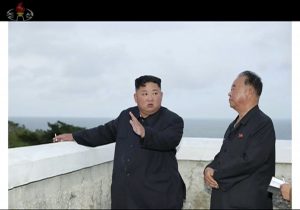Late last year, North Korea issued a warning. It said that its hard-line policy toward the United States may include a “Christmas Gift” of a nuclear or ICBM test. In fact, there was no such thing, and the tone of reporting on the Enlarged Meeting of the Central Military Commission of the Workers’ Party of Korea and the Fifth Plenary Meeting of Seventh Central Committee of the Workers’ Party of Korea held at the end of December was also rather restrained. There is a lesson here.
There is no denying that the “Christmas Gift” threat was over-reported. It originated with a statement made on December 3 by Ri Thae Song, the vice minister of Foreign Affairs of North Korea in charge of U.S. affairs, who said “What is left to be done now is the U.S. option and it is entirely up to the U.S. what Christmas gift it will select to get.” This was the one and only time that North Korea used the term “Christmas Gift.” But the expression was catchy enough that it was seized on by the U.S. government and the media.
Over a period of two months from late October, North Korea issued a dozen or more statements by named individuals criticizing the United States. This was the first time the country had issued so many statements by named individuals in such a short space of time. These individuals included officials involved in diplomacy with the U.S., such as Kim Kye Gwan, advisor of North Korea’s Foreign Ministry, Kim Yong Chol, Chairman of the Korea-Asia Pacific Peace Committee, and Choe Son Hui, the First Vice Minister of Foreign Affairs, as well as other prominent officials such as Pak Jong Chon, Chief of the General Staff of the Korean People’s Army. Since it is unthinkable for individuals in North Korea to communicate important messages to foreign countries on their own initiative, the statements were undoubtedly issued with the approval of the supreme leader. A careful read of the statements reveals subtle changes in tone, reflecting the role assigned to each sender. It was the vice foreign minister who referred to a “Christmas Gift.” Yet the vice foreign minister does not have the authority to conduct nuclear tests or launch missiles.
More importantly, each of these statements was sent by the Korean Central News Agency (KCNA) to external sources only, never once appearing in Rodong Sinmun, which is seen by the North Korean people. The fact that people inside North Korea were never informed of this hardline attitude indicates that the regime was anticipating the possibility that the United States would make concessions.
Since the United States over-reacted to the “Christmas Gift,” expression, North Korea had to consider the possibility that it would do something. However, an analysis of the tone of media discourse in North Korea makes clear that the reference to a Christmas Gift” was designed merely to intimidate.
For example, looking back at news coverage of Kim Jong Un, in November he visited several military units and attended the launch of a “super-large multiple launch rocket system,” whereas in December he made no visits to military sites. Instead, he extolled the newly opened “ideal town for the people (Samjiyon County)” and “Yangdok Hot Springs and ski resort” as accomplishments that would help build the economy. The tone of the discourse was optimistic, anticipating that North Korea would attract more tourists from overseas than before.
In December 14 statement, Pak Jong Chon said, “In the situation of the acute confrontation, the U.S. and other hostile forces will spend the year-end in peace only when they hold off any words and deeds rattling us.” The Kim Jong Un Administration, which should have pushed the United States for “a bold decision” while holding out the possibility of taking a “new way,” said the United States “will spend the year-end in peace” if it is careful about its words and deeds. This is a considerably toned-down statement, indicating that a “Christmas Gift” was always an unlikely possibility.
In Japan too, the term ‘Christmas Gift’ was reported extensively for several days. Since Japanese society considers North Korea to be a de facto enemy, it is difficult for intellectuals to argue that “it is unlikely that North Korea will take a hardline stance this year,” even if this is borne out by their analysis of the tone of the discourse. As a result, news reports issuing alerts were prominent.
In his New Year Address last year, Kim Jong Un mentioned that North Korea may seek a “new way” if the United States did not make concessions. Already in his policy speech in April, following the failure of the 2019 North Korea–United States Hanoi Summit Kim had stated that, “Anyway, we will wait for a bold decision from the U.S. with patience till the end of this year,” threatening to take a “new way” if such a decision was not forthcoming. However, the policy presented at the end of the year at the Plenary Meeting contained nothing new, and even the term “new way” had disappeared. For the Kim Administration, which seeks to perpetuate its system, war is to be avoided at all costs. As such, its options are somewhat limited.
Assuming the worst is the basis of security. However, it is also important to pick up on the nuances of the tone of discourse coming of North Korea and to convey its true nature. That lesson was our true “Christmas Gift.”
Atsuhito Isozaki is an associate professor at Keio University.
































